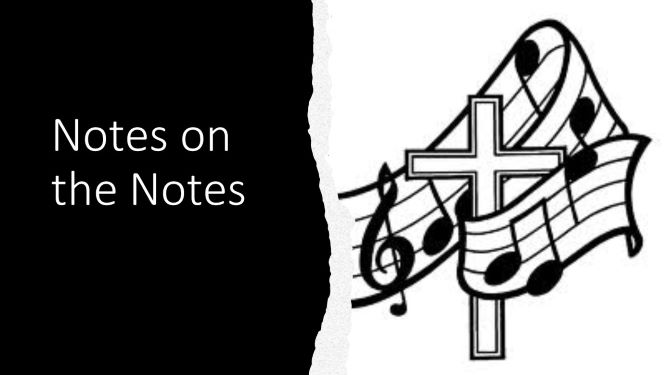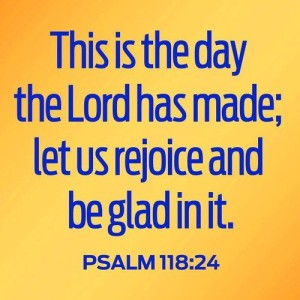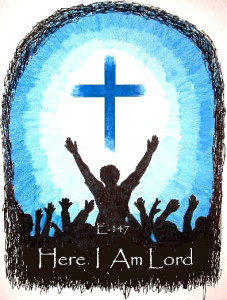Notes on the Notes – October 20, 2024

World Food Sunday
This week’s music:
“This is the Day” (VU #412)
“This is the day, this is the day
that our God has made, that our God has made;
we will rejoice, we will rejoice,
and be glad in it, and be glad in it.
This is the day that our God has made,
we will rejoice and be glad in it.
This is the day, this is the day
that our God has made.
Open to us, open to us
your gates, O God, your gates, O God;
we will go in, we will go in,
to your holy place, to your holy place.
Open to us your gates, O God,
we will go in to your holy place.
Open to us, open to us your gates, O God.
You are our God, you are our God,
we will praise your name, we will praise you name;
we will give thanks, we will give thanks,
for your faithfulness, for your faithfulness.
You are our God, we will praise your name,
we will give thanks for your faithfulness.
You are our God, you are our God, we will praise your name.
This is the day, this is the day
that our God has made, that our God has made;
we will rejoice, we will rejoice,
and be glad in it, and be glad in it.
This is the day that our God has made,
we will rejoice and be glad in it.
This is the day, this is the day
that our God has made.”
The first verse of our opening hymn was written by Leslie Norman Garrett, a pastor in Western Australia, in 1967. The second and third verses were written by R. Gerald Hobbs and published in the United Church supplemental hymn book, “Songs for a Gospel People” (1987). The words reference Psalm 118. The tune is also attributed to Leslie Garrett, based on a folk tune from Fiji, and the arrangement we are using is by Darryl Nixon.
“Will You Come and Follow Me” (VU #567)
This hymn, also known as “The Summons” was written by John Bell of the Iona Community. The first four verses contain the questions that Jesus poses to us –
“Will you come and follow me if I but call your name?
Will you go where you don’t know and never be the same?
Will you let my love be shown, will you let my name be know,
Will you let my life be grown in you and you in me?
Will you leave yourself behind if I but call your name?
Will you care for cruel and kind and never be the same?
Will you risk the hostile stare should your life attract or scare?
Will you let me answer prayer in you and you in me?
Will you let the blinded see if I but call your name?
Will you set the prisoners free and never be the same?
Will you kiss the leper clean, and do such as this unseen,
And admit to what I mean in you and you in me?
Will you love the “you” you hide if I but call your name?
Will you quell the fear inside and never be the same?
Will you use the faith you’ve found to reshape the world around,
Through my sight and touch and sound in you and you in me?
Jesus’ questions involve taking personal risks as well as risks in the world as his followers. Being a follower of Jesus also requires a change in us, both in attitude and in action.
The final verse of the hymn is our answer – our commitment to move forward with Christ and never be the same:
“Christ, your summons echoes true when you but call my name.
Let me turn and follow you and never be the same.
In your company I’ll go where your love and footsteps show.
Thus I’ll move and live and grow in you and you in me.”
The tune is the traditional Scottish tune KELINGROVE, which is the same tune as the hymn “Will You Come and See the Light” another hymn about making choices to follow Jesus.
Hear the hymn sung by Robert Kochis at: http://www.youtube.com/watch?v=V0aAkOe87mo
“Speak, O Lord”
“Speak, O Lord, as we come to You,
To receive the food of Your holy Word.
Take Your Truth, plant it deep in us;
Shape and fashion us in Your likeness;
That the light of Christ might be seen today
In our acts of love and our deeds of faith.
Speak, O Lord, and fulfill in us all Your purposes for Your glory.
Teach us, Lord, full obedience, holy reverence, true humility.
Test our thoughts and our attitudes in the radiance of Your purity.
Cause our faith to rise, cause our eyes to see
Your majestic love and authority.
Words of power that can never fail;
Let their truth prevail over unbelief.
Speak, O Lord, and renew our minds,
Help us grasp the heights of Your plans for us.
Truths unchanged from the dawn of time,
That will echo down through eternity;
And by grace we’ll stand on Your promises;
And by faith we’ll walk as You walk with us.
Speak, O Lord, ’til Your church is built,
And the earth is filled with Your glory.
Speak, O Lord, ’til the earth is filled with your glory.”
This week’s anthem is by Stuart Townsend and Keith Getty. It has been arranged by Fred and Ruth Coleman and comes from the collection “In Christ Alone.” The words are a request for God to change us fully into faithful followers of Jesus.
Hear the original version at: https://www.youtube.com/watch?v=my90e3a_nlM
“I, the Lord of Sea and Sky” (VU #509)
I, the Lord of sea and sky,
I have heard my people cry.
All who dwell in deepest sin my hand will save.
I who made the stars of night,
I will make their darkness bright.
Who will bear my light to them?
Whom shall I send?
Here I am, Lord. Is it I, Lord?
I have heard you calling in the night.
I will go, Lord, if you lead me.
I will hold your people in my heart.
I, the Lord of snow and rain,
I have borne my people’s pain.
I have wept for love of them;
They turn away.
I will break their hearts of stone, give them hearts for love alone.
I will speak my word to them.
Whom shall I send?
Here I am, Lord. Is it I, Lord?
I have heard you calling in the night.
I will go, Lord, if you lead me.
I will hold your people in my heart.
I, the Lord of wind and flame,
I will tend the poor and lame.
I well set a feast for them;
My hand will save.
Finest bread I will provide till their hearts be satisfied.
I will give my life to them.
Whom shall I send?
Here I am, Lord. Is it I, Lord?
I have heard you calling in the night.
I will go, Lord, if you lead me.
I will hold your people in my heart.”
This hymn was written by Dan Schutte in 1981. “The stirring refrain is perhaps the first part of the hymn to capture the singer’s imagination.…“Here I Am, Lord” recalls immediately Isaiah 6:8: “Then I heard the voice of the Lord saying, ‘Whom shall I send, and who will go for us?’ And I said, ‘Here am I; send me!’”
An unusual attribute of this hymn is the change in point of view that the singer makes between the verses and the refrain. The verses speak from the perspective of God, while the refrain is from the perspective of the singers of the hymn offering their lives to God.
Each verse reflects a paradox. The powerful God, creator of “sea and sky,” “snow and rain” and “wind and flame” is also the God who hears the “people cry,” bears the “people’s pain” and “tend[s] the poor and lame.” This is a hymn of transformation. God transforms the darkness into light in stanza one, melts “hearts of stone” with love in stanza two and nourishes the “poor and lame” with the “finest bread.”
Each stanza ends with the question, “Whom shall I send?” … The refrain immediately offers the response, “Here I am, Lord.”…” (Source: http://www.umcdiscipleship.org/resources/history-of-hymns-here-i-am-lord)
Original version of the song, sung by the songwriter, Dan Schutte: https://www.youtube.com/watch?v=zBg-yDhM2KY
“Praise God from Whom All Blessings Flow” (VU #541)
“Praise God from whom all blessings flow;
Praise God, all creatures high and low;
Give thanks to God in love made known:
Creator, Word and Spirit, One. Amen.”
The words for this traditional Doxology were written around 1674 by Thomas Ken, and updated for Voices United. A Doxology is a short hymn of praise to God, which is often used as an offering response. The music, OLD 100th, is from the Genevan Psalter (1551).
“We are Pilgrims (The Servant Song)” (VU #595)
“We are pilgrims on a journey, fellow travelers on the road;
We are here to help each other walk the mile and bear the load.
Sister, let me be your servant, let me be as Christ to you;
Pray that I may have the grace to let you be my servant too.
I will hold the Christ-light for you in the night-time of your fear;
I will hold my hand out to you, speak the peace you long to hear.
I will weep when you are weeping, when you laugh I’ll laugh with you;
I will share your joy and sorrow, till we’ve seen this journey through.
When we sing to God in heaven, we shall find such harmony,
Born of all we’ve known together of Christ’s love and agony.
Brother, let me be your servant, let me be as Christ to you;
Pray that I may have the grace to let you be my servant too.”
Our closing hymn was written in 1974 by Richard Gillard, and was first published in Songs of the Kingdom (1977). The words of the hymn express our desire to walk our faith journey with others, sharing the joys and sorrows in a spirit of community.
“For the Harvests of the Spirit” (VU #227 v 3)
“For the harvests of the Spirit, thanks be to God.
For the good we all inherit, thanks be to God.
For the wonders that astound us, for the truths that still confound us,
Most of all that love has found us, thanks be to God.”
Our benediction response sends us out in praise and thanksgiving for God’s goodness. The words were written by Fred Pratt Green in 1970 and remind us of God’s gifts to us, especially the gift of God’s unending love. The words have been set to the traditional Welsh song “Ar Hyd Y Nos (All Through the Night), which was arranged as a hymn tune by Ralph Vaughan Williams in 1906.
Bonus video: Abundant Life
Categories: Notes on the Notes


You must be logged in to post a comment.